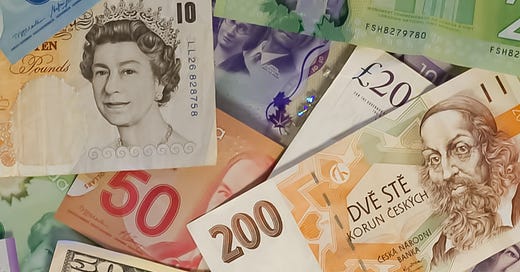Marching towards poverty - March 2022
Class war, utility bills, poverty and hunger. Our politicians have no skills to help us pay the bills.
Very soon millions of UK citizens are going to find themselves unable to pay the bills. There is seemingly nothing they can do about this, other than take on more work or more debt, and our elected politicians say there is nothing that they can do about this. They say their hands are tied, while the market is guided by an invisible hand that cannot be controlled.
Except in other countries, where domestic energy prices, subject to international pressures, are experiencing price increases, elected governments are able to take steps to ease the burdens on citizens.
France has committed to capping an increase on regulated electricity costs at 4%. To help do this the government has ordered utility EDF, which is 80% state owned, to sell more cheap nuclear power to rivals.
Danish lawmakers have agreed a so-called “heat check,” which means subsidies worth 1 billion Danish crowns (£113 million) will be paid to some 320,000 of the hardest-hit households.
In Germany the government of Chancellor Olaf Scholz has approved tax relief measures totalling 4.5 billion euros this year, including an allowance for commuters, to help households with exploding energy prices.
Greece has spent some 2.5 billion euros in power and gas bill subsidies since September and detailed additional aid of 1.1 billion euros last week, which includes a fuel rebate for low-income households.
Italy last week approved a new package to help consumers and firms cope with surging energy costs. The package, worth 4.4-billion euro, is the latest step to curb energy and fuel prices and comes on top of some 16 billion euros budgeted since last July to try and soften electricity and gas bills for firms and households
Poland has announced tax cuts on energy, petrol and basic food items, as well as cash handouts for households. It has also extended regulated gas prices for households and institutions like schools and hospitals until 2027.
Norway has been subsidising household electricity bills since December and currently covers 80% of the portion of power bills above a certain rate. Earlier in March, the minority government proposed to extend the scheme by one year to March 2023.
Spain cut several taxes to try to reduce consumer bills, originally planning to maintain the lower rates until the end of the year, but it decided in December to keep them lower until May 2022.
Sweden will compensate households worst hit by the surge in electricity prices, with the government setting aside 6 billion Swedish crowns (£484 million) for the measures.
Those countries have a mix of centre right and centre left governments and coalitions, with Spain being a more left wing exception. One would think that the welfare of citizens, skipping meals and shivering in their own home, would be an issue that was beyond ideology. But it seems no issue is outside the grip of certain flavour of right wing ideology currently in vogue in the British Conservative party.
The UK government has announced a package of measures, including a £200 pounds discount on electricity bills for all households to be repaid over five years, and a £150 pound rebate on council tax bills for around 80% of households in England.
Energy poverty campaigners said with a further price cap rise expected in October the measures do not go far enough and are calling on the government to do more in this week's spring financial statement such as removing VAT - value added tax - from energy bills.
What will we see when the bills go unpaid? Bailiffs at doors? Poll Tax style riots? Plea’s for help? Demands for change? 40 years of neo-miserablism has produced a strange system that absorbs all change - even demands for change. This Capitalist Realism, that there is no alternative to the status quo, exists as a filter across virtually all aspects of life, perfectly memed by the They Live glasses.
We live in a system written by men who believe that holding the world hostage to nuclear war and climate in-action, is an acceptable cost for their continuing dominance and exploitation. It's time for something new. But when progressive ideas from the left are mocked by a cynical hard left podcasting elite and ideas from the right are checked by the liberal commentariat, all hopes for change are absorbed, even sold back to us.
Byung-Chul Han writes in Open Democracy
Why is the neoliberal system of domination so stable? Why is there so little resistance to it? Why does the resistance that does occur so quickly come to naught? Why, despite the ever-expanding divide between rich and poor, is revolution no longer possible? To explain this state of affairs, we need a precise understanding of how power and domination function today.
The neoliberal system of domination has a wholly different structure. Now, system-preserving power no longer works through repression, but through seduction — that is, it leads us astray. It is no longer visible, as was the case under the regime of discipline. Now, there is no longer a concrete opponent, no enemy suppressing freedom that one might resist.
Neoliberalism turns the oppressed worker into a free contractor, an entrepreneur of the self. Today, everyone is a self-exploiting worker in their own enterprise. Every individual is master and slave in one. This also means that class struggle has become an internal struggle with oneself. Today, anyone who fails to succeed blames themselves and feels ashamed. People see themselves, not society, as the problem.
It is important to distinguish between power that posits and power that preserves. Today, power that maintains the system assumes a “smart” and friendly guise. In so doing, it makes itself invisible and unassailable. The subjugated subject does not even recognize that it has been subjugated. The subject thinks she is free. This mode of domination neutralizes resistance quite effectively. Domination that represses and attacks freedom is not stable. The neoliberal regime proves stable by immunizing itself against all resistance, because it makes use of freedom instead of repressing it. Suppressing freedom quickly provokes resistance; exploiting freedom does not.
Neoliberalism cannot be explained in Marxist terms. The famous “alienation” of labour does not even occur. Today, we dive eagerly into work - until we burn out.
Politics is downstream from culture so to change politics one must first change culture. But Culture is downstream from Capital. Hence right wing millionaires attempting societal change via astro-turf campaigns. Direct Democracy is a route out of Neoliberal Capitalist Realism. A citizenry empowered with revolutionary enfranchisement and the opportunity to vote on crucial issues of state regularly is the alternative to millions in the bank. Millions on the street, or now that we have the technology to facilitate this, millions online and voting securely.
A working class with no class consciousness cannot consciously fight a class war. A citizenry with a natural moral clarity, seeking to preserve the NHS, end child hunger or tax the rich, could if given the ability to directly interact with their democracy, unencumbered by representatives (MPs), change our world radically for the better.




